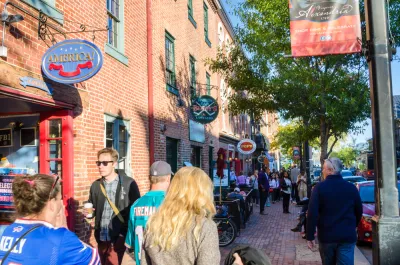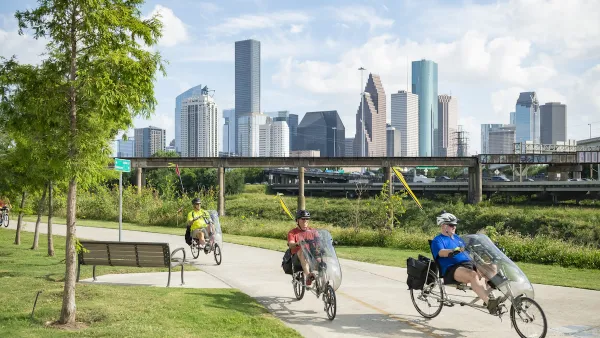When mixed-use development isn’t enough to create vibrant, walkable neighborhoods.

Urbanists make a lot of hay of ‘mixed use,’ writes Erin Caldwell in an op-ed for Next City. Neighborhoods need diverse businesses and services to thrive, urbanists frequently say. But what about the types of businesses?
According to Caldwell, “A neighborhood dense with businesses that do not meet the weekly needs of residents is no better than a neighborhood absent businesses with respect to walkability. Walkability depends, at least in part, on having comprehensive retail.”
For Caldwell, this offers an opportunity for cities to guide development through their zoning codes. “How can cities encourage the presence of businesses that satisfy daily necessities? While zoning based on business type is not new, traditional zoning does not take business usefulness into account. But what if zoning laws allowed useful businesses in residential or mixed-use areas and relegated non-useful businesses to industrial or commercial districts?”
Usefulness is, of course, subjective, so this type of code may be difficult to create and enforce. Caldwell suggests creating objective measures such as the number of in-person transactions or amenities such as public restrooms, bike racks, or public seating. “Besides re-zoning, enrichment through mixed-use can be achieved by permitting business spaces attached to residential units, commonly known as accessory commercial units.”
For Caldwell, retail can have a major impact on community. “Accessible retail and recreation centers are akin to ‘town squares’ in that they provide places and reasons for neighbors to congregate. Repeat visits to businesses increase the likelihood of interaction between neighbors, as well as business staff, who also form an integral part of the community.”
FULL STORY: For Walkable Neighborhoods, We Need More Useful Businesses

Analysis: Cybertruck Fatality Rate Far Exceeds That of Ford Pinto
The Tesla Cybertruck was recalled seven times last year.

National Parks Layoffs Will Cause Communities to Lose Billions
Thousands of essential park workers were laid off this week, just before the busy spring break season.

Retro-silient?: America’s First “Eco-burb,” The Woodlands Turns 50
A master-planned community north of Houston offers lessons on green infrastructure and resilient design, but falls short of its founder’s lofty affordability and walkability goals.

Test News Post 1
This is a summary

Analysis: Cybertruck Fatality Rate Far Exceeds That of Ford Pinto
The Tesla Cybertruck was recalled seven times last year.

Test News Headline 46
Test for the image on the front page.
Urban Design for Planners 1: Software Tools
This six-course series explores essential urban design concepts using open source software and equips planners with the tools they need to participate fully in the urban design process.
Planning for Universal Design
Learn the tools for implementing Universal Design in planning regulations.
EMC Planning Group, Inc.
Planetizen
Planetizen
Mpact (formerly Rail~Volution)
Great Falls Development Authority, Inc.
HUDs Office of Policy Development and Research
NYU Wagner Graduate School of Public Service




























